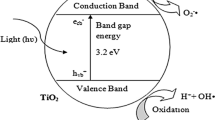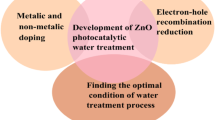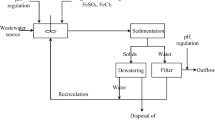Abstract
Advanced Reduction Processes (ARP) are emerging technology that allows the breakdown of oxidation-resistant pollutants by producing reductant radicals such as hydrated electrons (eaq–) and hydrogen radicals (H•). Because of that, it is a suitable treatment method for recalcitrant compounds such as 2,4,6-trinitrotoluene (TNT). Although the requirements of the process cannot be fully defined, it’s promising for wastewater treatment due to its short reaction times and easy operation. In this study, the TNT degradation efficiency of UV (253.7 nm wavelength) combined with reducing agents such as sulfite, dithionite, and sulfide was investigated. Important process parameters such as agent selection, pH, agent dose, initial TNT concentration, and UV intensity were optimized. Almost 100% TNT removal was observed by dithionite/UV process after 30 min under optimum conditions (1.5 mM dithionite, pH = 7, 8000 μW/cm2 UV, initial TNT concentration = 25 mg/L). For dithionite, molar absorption and quantum yield for TNT were calculated at 254 nm wavelength ε = 87.33 1/M·cm and φ = 0.199 mol/Einstein, respectively.






Similar content being viewed by others
Data Availability
The authors declare that all data supporting the findings of this study are available within the article.
References
Alnaizy, R., & Akgerman, A. (1999). Oxidative treatment of high explosives contaminated wastewater. Water Research, 33(9), 2021–2030. https://doi.org/10.1016/S0043-1354(98)00424-2
Beck, A. J., Gledhill, M., Schlosser, C., Stamer, B., Böttcher, C., Sternheim, J., et al. (2018). Spread, behavior, and ecosystem consequences of conventional munitions compounds in Coastal marine waters. Frontiers in Marine Science, 5(APR) https://doi.org/10.3389/fmars.2018.00141.
Botlaguduru, V. S. V., Batchelor, B., & Abdel-Wahab, A. (2015). Application of UV-sulfite advanced reduction process to bromate removal. Journal of Water Process Engineering, 5, 76–82. https://doi.org/10.1016/j.jwpe.2015.01.001
Buxton, G. V., Greenstock, C. L., Helman, W. P., & Ross, A. B. (1988). Critical Review of rate constants for reactions of hydrated electrons, hydrogen atoms and hydroxyl radicals (⋅OH/⋅O− in Aqueous Solution. Journal of Physical and Chemical Reference Data, 17(2), 513–886. https://doi.org/10.1063/1.555805
Cao, Y., Qiu, W., Li, J., Jiang, J., & Pang, S. (2021). Review on UV/sulfite process for water and wastewater treatments in the presence or absence of O2. Science of the Total Environment, 765, 142762. https://doi.org/10.1016/j.scitotenv.2020.142762
Chusova, O. (2015). Remediation of TNT-contaminated water by using industrial low-cost residue pine bark. Malardalen University.
Dogliotti, L., & Hayon, E. (1968). Flash photolysis study of sulfite, thiocyanate, and thiosulfate ions in solution. Journal of Physical Chemistry, 72(5), 1800–1807. https://doi.org/10.1021/j100851a073
Dzhabiev, T. S., & Tarasov, B. B. (1993). Photochemical decomposition of an aqueous solution of sodium sulphide. Journal of Photochemistry and Photobiology a: Chemistry, 72(1), 23–27.
Farzaneh, H. (2014). Degradation of Trichloroethylene Using Advanced Reduction Processes. Texas A&M University. Retrieved from https://oaktrust.library.tamu.edu/bitstream/handle/1969.1/153936/FARZANEH-THESIS-2014.pdf?sequence=1.
Gurbulak, E., Yuksel, E., Tekbas, M., Doruk, T., Eyvaz, M., Bektas, N., et al. (2016). Supercritical water oxidation of octol – containing wastewater, 21(2), 77603–77621. https://doi.org/10.1021/ie5043903.
Guz, R., de Moura, C., da Cunha, M. A. A., & Rodrigues, M. B. (2017). Factorial design application in photocatalytic wastewater degradation from TNT industry—red water. Environmental Science and Pollution Research, 24(7), 6055–6060. https://doi.org/10.1007/s11356-016-6460-4
Hara, K., Sayama, K., & Arakawa, H. (1999). UV photoinduced reduction of water to hydrogen in Na2S, Na2SO3, and Na2S2O4 aqueous solutions. Journal of Photochemistry and Photobiology a: Chemistry, 128(1–3), 27–31. https://doi.org/10.1016/S1010-6030(99)00156-2
Hayon, E., Treinin, A., & Wilf, J. (1971). Electronic Spectra, Photochemistry, and Autoxidation Mechanism of the Sulñte-Bisulfite-Pyrosulfite Systems. The S02TM, S03”, S04“, and SOB" Radicals, 4(5), 47–57.
He, X., Zeng, Q., Zhou, Y., Zeng, Q., Wei, X., & Zhang, C. (2016). A DFT Study Toward the Reaction Mechanisms of TNT With Hydroxyl Radicals for Advanced Oxidation Processes. The Journal of Physical Chemistry A, 120(20), 3747–3753. https://doi.org/10.1021/acs.jpca.6b03596
Hu, P., Zhang, Y., Lv, F., Wang, X., Wei, F., Meng, X., & Jiang, S. (2014). Organic pollution removal from TNT red water using Cu-impregnated activated coke. Water, Air, and Soil Pollution, 225(4) https://doi.org/10.1007/s11270-014-1936-7.
Incoll, L. D., Long, S. P., & Ashmore, M. R. (1981). SI Units in publications in plant science. In H. Smith (Eds.), Commentaries in Plant Science (2nd ed., pp. 83–96). Elsevier.
Jung, B., Nicola, R., Batchelor, B., & Abdel-Wahab, A. (2014). Effect of low- and medium-pressure Hg UV irradiation on bromate removal in advanced reduction process. Chemosphere, 117(1), 663–672. https://doi.org/10.1016/j.chemosphere.2014.09.086
Jung, B., Sivasubramanian, R., Batchelor, B., & Abdel-Wahab, A. (2017). Chlorate reduction by dithionite/UV advanced reduction process. International Journal of Environmental Science and Technology, 14(1), 123–134. https://doi.org/10.1007/s13762-016-1132-y
Kaushik, V., Duan, Y., Jung, B., Batchelor, B., & Abdel-Wahab, A. (2018). Arsenic removal using advanced reduction process with dithionite/UV—A kinetic study. Journal of Water Process Engineering, 23(February), 314–319. https://doi.org/10.1016/j.jwpe.2018.04.012
Kong, X., Jiang, J., Ma, J., Yang, Y., Liu, W., & Liu, Y. (2016). Degradation of atrazine by UV/chlorine: Efficiency, influencing factors, and products. Water Research, 90, 15–23. https://doi.org/10.1016/j.watres.2015.11.068
Kröger, M., & Fels, G. (2007). Combined biological-chemical procedure for the mineralization of TNT. Biodegradation, 18(4), 413–425. https://doi.org/10.1007/s10532-006-9076-4
Layton, D., Mallon, B., Mitchell, W., Hall, L., Fish, R., Perry, L., et al. (1987, December 1). Conventional weapons demilitarization: A health and environmental effects data-base assessment. Retrieved September 4, 2022, from https://www.osti.gov/biblio/6907613
Liu, X., Yoon, S., Batchelor, B., & Abdel-Wahab, A. (2013). Degradation of vinyl chloride (VC) by the sulfite/UV advanced reduction process (ARP): Effects of process variables and a kinetic model. Science of the Total Environment, 454–455, 578–583. https://doi.org/10.1016/j.scitotenv.2013.03.060
Liu, X., Vellanki, B. P., Batchelor, B., & Abdel-Wahab, A. (2014). Degradation of 1,2-dichloroethane with advanced reduction processes (ARPs): Effects of process variables and mechanisms. Chemical Engineering Journal, 237, 300–307. https://doi.org/10.1016/j.cej.2013.10.037
Liu, S., Han, J., Ding, Y., Gao, X., Cheng, H., Wang, H., et al. (2022). Advanced reduction process to achieve efficient degradation of pyridine. Chemosphere, 287(P3), 132240. https://doi.org/10.1016/j.chemosphere.2021.132240
Mahbub, P., & Nesterenko, P. N. (2016). Application of photo degradation for remediation of cyclic nitramine and nitroaromatic explosives. Royal Society of Chemistry, 6, 77603–77621. https://doi.org/10.1039/c6ra12565d
Makarov, G. N. (2001). The formation of an intense secondary pulsed molecular beam and obtaining accelerated molecules and radicals in it. Journal of Experimental and Theoretical Physics, 93(6), 1222–1230. https://doi.org/10.1134/1.1435743
Maloney, S.W., & Heine, R.L. (2005, March). Demonstration of the Anaerobic Fluidized Bed Reactor for Pinkwater Treatment at McAlester Army Ammunition Plant. Environmental Security Technology Certification Program. Retrieved September 5, 2022, from https://erdc-library.erdc.dren.mil/jspui/bitstream/11681/20101/1/CERL-TR-05-8.pdf
Mayhew, S. G. (1978). The Redox Potential of Dithionite and SO−2 from Equilibrium Reactions with Flavodoxins, Methyl Viologen and Hydrogen plus Hydrogenase. European Journal of Biochemistry, 85(2), 535–547. https://doi.org/10.1111/j.1432-1033.1978.tb12269.x
Mirshafiee, A., & Darvish, M. (2021). Degradation of 2, 4, 6-trinitrotoluene ( TNT ) from aqueous solution by coupled electrocoagulation process with persulfate salt. Journal of Environmental Health Science and Engineering, 19, 1035–1041.
Moussavi, G., & Rezaei, M. (2017). Exploring the advanced oxidation/reduction processes in the VUV photoreactor for dechlorination and mineralization of trichloroacetic acid: Parametric experiments, degradation pathway and bioassessment. Chemical Engineering Journal, 328, 331–342. https://doi.org/10.1016/j.cej.2017.07.006
Neta, P., Huie, R. E., & Rose, A. B. (1987). Rate constants for reactions of inorganic radicals and aqueous solution. Journal of Physical and Chemical Reference Data, 17, 1128–1141.
Norouzi, M., Karimian, A., Dehghani, H., & Rezvan Leylan, S. A. (2021). Photocatalytic degradation of 2,4,6-trinitrotoluene (TNT) in the presence of ZnS, NiS and ZnS/NiS supported Clinoptilolite under UV irradiation: experimental and neural network modelling. International Journal of Environmental Analytical Chemistry, 1–25. https://doi.org/10.1080/03067319.2021.1887859.
Spain, J. C., Hughes, J. B., & Knackmuss, H. J. (2000). Nitroaromatic Compounds and Explosives. Lewis Publishers.
United States Environmental Protection Agency. (2014). Technical Fact Sheet – 2,4,6-Trinitrotoluene (TNT). United States Environmental Protection Agency, (January), 1–8. http://www2.epa.gov/sites/production/files/2014-03/documents/ffrrofactsheet_contaminant_tnt_january2014_final.pdf.
Vellanki, B. P., & Batchelor, B. (2013). Perchlorate reduction by the sulfite/ultraviolet light advanced reduction process. Journal of Hazardous Materials, 262, 348–356. https://doi.org/10.1016/J.JHAZMAT.2013.08.061
Walsh, J. T., Chalk, R. C., & Merritt, C. (1973). Application of Liquid Chromatography to Pollution Abatement Studies of Munition Wastes. Analytical Chemistry, 45(7), 1215–1220. https://doi.org/10.1021/ac60329a015
Yazdanbakhsh, A., Eslami, A., Moussavi, G., Rafiee, M., & Sheikhmohammadi, A. (2018). Photo-assisted degradation of 2, 4, 6-trichlorophenol by an advanced reduction process based on sulfite anion radical: Degradation, dechlorination and mineralization. Chemosphere, 191, 156–165. https://doi.org/10.1016/j.chemosphere.2017.10.023
Yu, X., Cabooter, D., & Dewil, R. (2018). Effects of process variables and kinetics on the degradation of 2,4-dichlorophenol using advanced reduction processes (ARP). Journal of Hazardous Materials, 357(December 2017), 81–88. https://doi.org/10.1016/j.jhazmat.2018.05.049
Zappi, M. E., Hernandez, R., Gang, D., Bajpai, R., Kuo, C. H., & Hill, D. O. (2016). Treatment of groundwater contaminated with high levels of explosives using advanced oxidation processes. International Journal of Environmental Science and Technology, 13(12), 2767–2778. https://doi.org/10.1007/s13762-016-1109-x
Acknowledgements
This work was supported by The Scientific and Technological Research Council of Turkey (TUBITAK) (grant number 119Y394).
Author information
Authors and Affiliations
Corresponding author
Ethics declarations
Conflict of Interest
The authors declare that they have no conflict of interest.
Additional information
Publisher's Note
Springer Nature remains neutral with regard to jurisdictional claims in published maps and institutional affiliations.
Rights and permissions
Springer Nature or its licensor (e.g. a society or other partner) holds exclusive rights to this article under a publishing agreement with the author(s) or other rightsholder(s); author self-archiving of the accepted manuscript version of this article is solely governed by the terms of such publishing agreement and applicable law.
About this article
Cite this article
Yasar, H., Ince, E., Ince, M. et al. Determination of Optimum Conditions for the Degradation of 2,4,6-Trinitrotoluene (TNT) by Advanced Reduction Processes. Water Air Soil Pollut 234, 771 (2023). https://doi.org/10.1007/s11270-023-06794-8
Received:
Accepted:
Published:
DOI: https://doi.org/10.1007/s11270-023-06794-8




